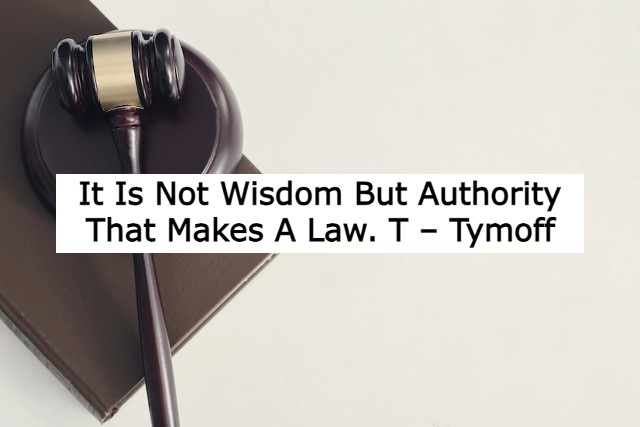The statement “It is not wisdom but authority that makes a law. t – tymoff” encapsulates a profound observation about the nature of legal systems and governance. At its core, this quote highlights the reality that laws are often the product of power structures rather than purely rational or ethical considerations. This article delves into the various dimensions of this statement, exploring the implications of authority in lawmaking, historical and contemporary examples, and the delicate balance between authority and wisdom in governance.
Introduction to Tymoff’s Perspective
Tymoff’s assertion challenges the idealistic view that laws are purely based on wisdom, reason, and justice. Instead, it suggests that the actual process of lawmaking is heavily influenced by those in positions of power. This perspective raises important questions about the legitimacy, fairness, and ethical grounding of laws, prompting a deeper examination of how authority shapes legal frameworks.
Understanding the Concept of Authority
Authority in the context of law refers to the legitimate power or right to create, enforce, and interpret laws. This authority is vested in various institutions, such as governments, parliaments, and courts, which derive their power from constitutions, social contracts, or other foundational legal documents. The effectiveness of authority in lawmaking is based on the recognition and acceptance of this power by the governed populace.
The Nature of Legal Authority
Legal authority can take several forms, including:
- Legislative Authority: The power to enact laws, typically held by elected bodies such as parliaments or congresses.
- Executive Authority: The power to implement and enforce laws, usually vested in the government or executive branch.
- Judicial Authority: The power to interpret laws and adjudicate disputes, held by the courts.
Each form of authority plays a crucial role in the lawmaking process, but the underlying authority is often derived from political power and social control rather than purely from wisdom or ethical considerations.
The Role of Wisdom in Lawmaking
Wisdom in lawmaking involves the application of knowledge, ethical principles, and rational deliberation to create laws that promote justice, equity, and the common good. Ideally, lawmakers should strive to craft legislation based on careful consideration of evidence, ethical implications, and long-term societal benefits. However, the influence of wisdom in lawmaking is often constrained by political realities and power dynamics.
The Ideal vs. The Real
In an ideal world, laws would be the product of collective wisdom, incorporating diverse perspectives and expert insights to address societal issues effectively. However, in reality, the process of lawmaking is frequently shaped by:
- Political Interests: Laws are often influenced by the interests of those in power, whether they be politicians, lobbyists, or influential groups.
- Power Dynamics: The ability to enact laws is closely tied to the control of political power and institutional authority.
- Pragmatic Considerations: Practical concerns, such as political feasibility and public opinion, often override purely rational or ethical considerations.
Historical Examples of Authority Over Wisdom
Throughout history, there have been numerous instances where authority, rather than wisdom, has been the primary driver of lawmaking. These examples illustrate the complexities and consequences of laws shaped by power dynamics.
The Rule of Absolute Monarchies
In many historical monarchies, laws were decreed by kings or emperors whose authority was absolute and unquestioned. These laws often reflected the ruler’s interests, desires, and strategies for maintaining power, rather than the collective wisdom or welfare of the populace. For example, King Louis XIV of France epitomized absolute monarchy with his statement, “L’état, c’est moi” (“I am the state”), asserting his complete authority over French law and governance.
Totalitarian Regimes
Totalitarian regimes, such as those led by Joseph Stalin in the Soviet Union or Adolf Hitler in Nazi Germany, provide stark examples of laws being driven by authoritarian power. In these regimes, laws were used as tools of repression, control, and ideological enforcement. The wisdom of such laws was subordinate to the goal of maintaining absolute authority and suppressing dissent.
Colonial Rule
During the colonial era, European powers imposed laws on their colonies to facilitate control and exploitation. These laws were often enacted without regard for the wisdom or customs of indigenous populations, reflecting the colonial authorities’ interests rather than the well-being of the colonized peoples. The imposition of English common law in British colonies, for instance, disregarded local legal traditions and norms.
The Impact of Authoritarian Lawmaking
When laws are made based primarily on authority without the underpinning of wisdom, several adverse outcomes can arise, affecting both individuals and societies.
Injustice and Oppression
Laws that lack a foundation in wisdom and ethical considerations can result in widespread injustice, discrimination, and oppression. Authoritarian laws often serve the interests of a select few, leading to societal inequities and the marginalization of vulnerable groups. The apartheid laws in South Africa, for instance, legally enforced racial segregation and discrimination, profoundly affecting the lives of millions.
Social Unrest and Resistance
Laws perceived as unjust or arbitrary can lead to social unrest, resistance, and even rebellion. When authority imposes laws without considering the wisdom and needs of the populace, it can result in widespread dissatisfaction and conflict. The American Revolution was fueled by colonial opposition to British laws and taxation imposed without adequate representation or consideration of the colonists’ rights.
Erosion of Trust in Legal Institutions
Authoritarian lawmaking can erode public trust in legal institutions and governance, undermining the social contract and leading to instability. When laws are seen as tools of oppression rather than instruments of justice, citizens may lose faith in the legal system and become disengaged from civic participation. This erosion of trust can weaken the rule of law and democratic principles.
Balancing Authority and Wisdom in Governance
The challenge for modern societies is to balance authority with wisdom in the process of lawmaking. This balance is essential for creating laws that are effective, just, and reflective of the collective interests of society.
Democratic Processes
Promoting democratic governance where laws are made through inclusive, transparent, and deliberative processes is crucial. Democratic systems allow for broader participation in the lawmaking process, ensuring that diverse perspectives and collective wisdom are incorporated. Public debates, legislative hearings, and referenda are examples of mechanisms that enhance democratic participation in lawmaking.
Checks and Balances
Establishing checks and balances within governmental systems is essential to prevent the abuse of authority and ensure that laws are scrutinized and guided by wisdom. Independent judiciaries, bicameral legislatures, and separation of powers are structural mechanisms that help balance authority and wisdom in governance. These checks and balances ensure that no single entity holds absolute power, promoting more considered and just laws.
Public Participation
Encouraging public participation in the lawmaking process is vital for incorporating diverse perspectives and wisdom from various segments of society. Civic engagement through public consultations, community forums, and stakeholder meetings allows citizens to voice their concerns and contribute to the development of laws. This participatory approach enhances the legitimacy and responsiveness of legal frameworks.
Case Studies: Successful and Unsuccessful Laws
Successful Law: Civil Rights Act of 1964
The Civil Rights Act of 1964 in the United States is an example of a law that balanced authority with wisdom. Enacted under the authority of the federal government, this landmark legislation was rooted in the wisdom of promoting equality, justice, and human rights. The Act addressed systemic discrimination and segregation, significantly advancing civil rights and social justice in the United States.
Unsuccessful Law: Prohibition in the United States
The Prohibition era (1920-1933) in the United States illustrates a law where authority overshadowed wisdom. The 18th Amendment, which prohibited the manufacture, sale, and transportation of alcohol, was enacted despite significant opposition and led to widespread illegal activities, corruption, and social problems. The law’s failure to consider practical realities and public sentiment ultimately led to its repeal.
Philosophical Perspectives on Law and Authority
Philosophers and legal theorists have long debated the relationship between authority and wisdom in law. Various perspectives highlight the complexities of balancing these elements in governance.
John Locke
John Locke emphasized the need for laws to be grounded in natural rights and justice. He argued that legitimate laws must reflect the consent of the governed and promote the common good. Locke’s social contract theory underscores the importance of wisdom and ethical considerations in lawmaking.
Thomas Hobbes
Thomas Hobbes highlighted the necessity of strong authority to maintain order and prevent anarchy. In his work “Leviathan,” Hobbes argued that a powerful sovereign is essential for societal stability and security. His perspective underscores the role of authority in creating and enforcing laws, even at the expense of individual freedoms.
Modern Implications of Tymoff’s Statement
In contemporary society, Tymoff’s statement remains relevant as we navigate complex legal and ethical challenges. Issues such as surveillance, digital privacy, and human rights highlight the need for laws that are not only authoritative but also wise and just. Ensuring that legal frameworks evolve in response to new challenges while maintaining ethical integrity is a critical task for modern governance.
Conclusion: Reflecting on Authority and Wisdom in Lawmaking
Assertion that “it is not wisdom but authority that makes a law. t – tymoff” serves as a reminder of the powerful role authority plays in shaping legal systems. However, it also underscores the importance of integrating wisdom into the lawmaking process to ensure that laws serve the greater good, promote justice, and uphold societal values. Balancing authority and wisdom is essential for creating legal frameworks that are both effective and equitable, guiding societies towards a more just and harmonious future.
In conclusion, while authority is indispensable in the creation and enforcement of laws, the infusion of wisdom, ethical considerations, and democratic principles ensures that these laws contribute positively to societal progress and human dignity.
1. What does the quote “it is not wisdom but authority that makes a law. t – tymoff mean?
A. The quote by Tymoff highlights the reality that laws are often created and enforced based on the power and authority of governing bodies rather than purely on wisdom or ethical considerations. It underscores the influence of political and institutional power in the lawmaking process, suggesting that the authority to enact and enforce laws is the primary driver, sometimes at the expense of rational or moral reasoning.
2. How does authority influence the lawmaking process?
A. Authority influences the lawmaking process by granting certain individuals or institutions the legitimate power to create, implement, and enforce laws. This power can come from various sources, such as constitutions, social contracts, or political mandates. Those in positions of authority, such as legislators, executives, and judges, use their power to shape legal frameworks, often reflecting the interests and priorities of the governing bodies rather than purely objective or ethical considerations.
3. Can you provide historical examples where authority rather than wisdom shaped laws?
A. Throughout history, there have been numerous instances where authority played a dominant role in shaping laws:
- Absolute Monarchies: In many historical monarchies, kings or emperors enacted laws based on their absolute authority, often prioritizing their interests and power over the common good.
- Totalitarian Regimes: Leaders like Joseph Stalin and Adolf Hitler used their authoritarian power to create laws that served to control and oppress the populace, often disregarding ethical considerations.
- Colonial Rule: Colonial powers imposed laws on their colonies to facilitate control and exploitation, often ignoring the customs and wisdom of indigenous populations.
4. How can modern societies balance authority and wisdom in lawmaking?
A. Modern societies can balance authority and wisdom in lawmaking by:
- Promoting Democratic Processes: Ensuring that laws are made through inclusive, transparent, and deliberative processes that incorporate diverse perspectives and collective wisdom.
- Establishing Checks and Balances: Implementing mechanisms to prevent the abuse of authority and ensure that laws are scrutinized and guided by ethical considerations.
- Encouraging Public Participation: Involving citizens in the lawmaking process through public consultations, forums, and other participatory methods to reflect broader societal wisdom.
5. Why is it important to integrate wisdom into the lawmaking process?
A. Integrating wisdom into the lawmaking process is crucial for several reasons:
- Promoting Justice and Equity: Wisdom ensures that laws are fair, just, and equitable, addressing the needs and rights of all members of society.
- Enhancing Legitimacy: Laws grounded in ethical and rational considerations are more likely to be respected and adhered to by the populace, enhancing their legitimacy.
- Preventing Social Unrest: Laws that reflect collective wisdom and ethical principles are less likely to cause social unrest and resistance, fostering a more stable and harmonious society.
- Ensuring Long-Term Benefits: Wise lawmaking considers the long-term implications and benefits for society, contributing to sustainable development and progress.


